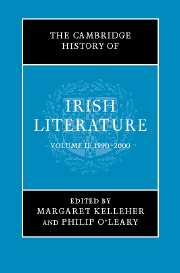Book contents
- Frontmatter
- Introduction
- 1 Literature and politics
- 2 The Irish Renaissance, 1890–1940: poetry in English
- 3 The Irish Renaissance, 1890–1940: prose in English
- 4 The Irish Renaissance, 1890–1940: drama in English
- 5 The Irish Renaissance, 1880–1940: literature in Irish
- 6 Contemporary prose and drama in Irish 1940–2000
- 7 Contemporary poetry in Irish: 1940–2000
- 8 Contemporary poetry in English: 1940–2000
- 9 Contemporary prose in English: 1940–2000
- 10 Contemporary drama in English: 1940–2000
- 11 Cinema and Irish literature
- 12 Literary historiography, 1890–2000
- Afterword: Irish-language literature in the new millennium
- Afterword: Irish literature in English in the new millennium
- Guide to major subject areas
- Index
Introduction
Published online by Cambridge University Press: 28 March 2008
- Frontmatter
- Introduction
- 1 Literature and politics
- 2 The Irish Renaissance, 1890–1940: poetry in English
- 3 The Irish Renaissance, 1890–1940: prose in English
- 4 The Irish Renaissance, 1890–1940: drama in English
- 5 The Irish Renaissance, 1880–1940: literature in Irish
- 6 Contemporary prose and drama in Irish 1940–2000
- 7 Contemporary poetry in Irish: 1940–2000
- 8 Contemporary poetry in English: 1940–2000
- 9 Contemporary prose in English: 1940–2000
- 10 Contemporary drama in English: 1940–2000
- 11 Cinema and Irish literature
- 12 Literary historiography, 1890–2000
- Afterword: Irish-language literature in the new millennium
- Afterword: Irish literature in English in the new millennium
- Guide to major subject areas
- Index
Summary
In 1875, one year short of the centennial of the American republic, the publisher George H. Putnam asked Moses Coit Tyler to produce a ‘manual’ of American literature. Tyler was to do much more than that. Convinced that it was now time to write an account of what he called ‘the most confidential and explicit record’ of the American mind, the record preserved in the nation’s literature, he undertook a full-scale history of American literature from 1607 to 1765, a pioneering effort that was to mark the beginning of the serious study of that literature. Tyler himself was in 1881 to join the faculty of Cornell University as the holder of the first professorship in the United States devoted to American history.
We believe that now is the time for a similar pioneering effort to create a coherent and authoritative history of Irish literature in the two major languages of the island. The publication in 1991 of the three-volume Field Day Anthology of Irish Writing, the first attempt to formulate a standard if not definitive anthology of Irish literature, has in effect established a canon of Irish literature, a canon since expanded with the appearance in 2002 of the fourth and fifth volumes of the anthology, volumes dedicated to writing by and about women. The existence of such a canon, however contested, only makes more compelling – even urgent – the need for an accessible and reliable historical framework within which the newly canonical texts can be read, and marginalised texts, together with the reasons for their marginalisation, can be explored.
- Type
- Chapter
- Information
- The Cambridge History of Irish Literature , pp. 1 - 8Publisher: Cambridge University PressPrint publication year: 2006

